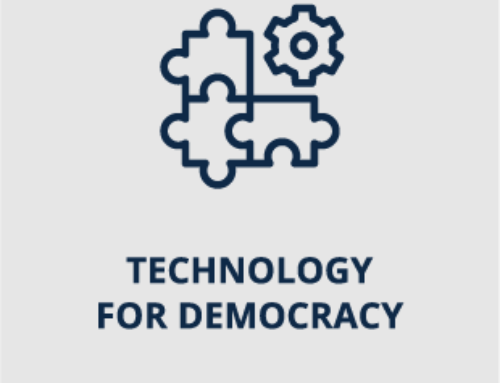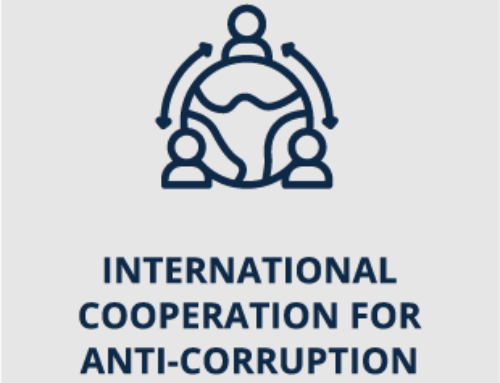In December of this year, the United States will convene a Summit for Democracy to amplify the Biden administration’s global human rights and democracy agenda and spur stronger, more coordinated global action in support of democracy. While the main focus will be on the commitments made by democratic governments, there is another group whose participation—and action—is equally, if not more important, to sustainable democracy.
The private sector plays a fundamental and underappreciated role in promoting healthy, sustainable democratic systems. Companies impact democracy through their day-to-day operations, business models, and public engagements, and their impacts stretch beyond their employees to their customers, users, suppliers, business partners, and communities. Companies impact democracy in obvious ways, like when social media companies fail to contain the spread of misinformation about elections, and less obvious ways, such as when search engine results favor one candidate or party over another. Companies’ actions also influence their employees: the 2021 Edelman Trust Barometer found companies to be the most trusted institution globally, with 61 percent of respondents indicating they trust their employer (compared to 53 percent who trust their government, and 51 percent who trust the media). Company actions in support of—or undermining—the summit’s goals of tackling authoritarianism, combating corruption, and promoting human rights will have a tremendous influence over the success of these efforts, both in companies’ home countries as well as in the work of transnational corporations overseas. And while companies have come a long way in accepting their responsibility to respect human rights, they are more reluctant to acknowledge the impact they have on democracy itself.
Nevertheless, democracy is good for business. While the misperception persists that autocracy is better for economic growth than democracy, more recent research finds this not to be the case. In fact, a comprehensive study found that in the long term, democracy increases GDP, and that democratic governments pursue more economic reforms, reduce social unrest, and see higher business investment than non-democracies. This should not be surprising—a strong foundation of rule of law reinforces the confidence of business to make long-term investments, knowing their property rights will be respected, contracts enforced, and operations less vulnerable to demands for bribery or corruption. Companies also benefit from business-friendly policies popular in liberal democracies, like government-sponsored research funding and public health care, and lose money when mismanagement causes electoral uncertainty.
Furthermore, citizens increasingly expect businesses to speak out on societal issues, including promoting democracy, and they reward companies for doing so. In a recent U.S. poll, an overwhelming majority of respondents—of both political parties—reported that they would see a company more favorably if it supported policies to make it easier for Americans to vote. Another survey found that 76 percent of respondents were more likely to want to work for a company that promoted democracy, and 81 percent were more likely to buy that company’s products or services.
With that in mind, it is critical that the private sector play a role both in the summit itself and in bringing concrete commitments to the table. To support these outcomes, here are some actions the private sector could commit to taking over the forthcoming “year of action” to create healthier, more sustainable democracies.
Commitments to Support Free, Fair, and Peaceful Elections
Elections are the most concrete expression of democracy—without successful elections, democracies cannot be sustainable. Companies strengthen democracy when they make it easier for their employees, customers, users, and communities to participate in the electoral process. Through a ladder of action, companies can commit to taking one-time steps, such as promoting elections through their social media channels, or undertake more sustained engagement by hosting community voter registration drives, conducting voter education, creating in-house civic engagement initiatives, and supporting direct engagement by C-suite executives, who can speak out on the need for free, fair, and peaceful elections. In countries where election day is not a holiday (such as the United States), companies can help by giving employees paid time off to vote, or better still, closing the office so that employees can vote and volunteer to be poll workers or election observers, or support get-out-the-vote efforts. Business and trade associations could make these steps a condition of membership.
Barriers to voting don’t just take place on election day, however. Underlying social and economic inequalities also impact turnout and representation. Voting rates in the United States and Europe, for example, are strongly correlated with income level, with minimum-wage workers the least likely to vote of any employed group. One of the most powerful commitments companies can take to support democracy is to pay their workers a living wage. In the United States, a full-time worker making the federal minimum wage cannot afford a one-bedroom apartment in 95 percent of U.S. counties. This means minimum-wage workers must often work multiple jobs to pay the bills—leaving little time for civic engagement. The same is true of workers in corporate supply chains around the world, and multinational corporations can use their purchasing power to help raise their wages as well.
Technology companies have a unique role in supporting free and fair elections. Algorithms designed and implemented by private companies control the vast majority of information the public sees about elections around the world, as well as on broader social and economic issues that may influence voters. Companies have the ability to prioritize news and information from credible outlets and de-prioritize misleading or incendiary content, as Facebook briefly chose to do in the weeks after the 2020 U.S. election, and could commit to doing so not just during election cycles but year-round. In addition to managing their own content, social media companies can also commit to support voter education around disinformation and misinformation online and support organizations that promote fact-checking and media literacy. Finally, the private sector is also increasingly involved in electoral administration, from producing and selling electronic voting machines to maintaining the integrity of servers over which results are transmitted. A lack of confidence in the security of such systems led to the nullification of Kenya’s 2017 presidential election. The private sector could commit to working more closely with governments and election observer organizations to develop international standards for private sector-supplied components of electoral administration and to make such systems easier for nonpartisan civil society observers to monitor.
Commitments to Support Sustainable, Inclusive Democracy
While elections are vital, they are a small component of a healthy democracy. Indeed electoral process questions make up only 3 of 25 questions in Freedom House’s Freedom in the World Index, which rates countries as being free, partly free, or not free. Around the world, rising economic inequality is also fueling mistrust in government as populations fail to see democracy delivering concrete results. In fact, the 2021 Democracy Perception Index found that around the world, people see economic inequality as the single biggest threat to democracy—more threatening than limitations on free speech or even fraudulent elections.
This perception is borne out by economic realities. In 1965 the average U.S. CEO made 21 times the average worker; by 2019 that ratio was 320:1. In India the ratio is 229:1; in South Africa it’s 180:1. As a starting point, companies can commit to closing this gap; those that have done so have found not only increased company revenue and lower employee turnover, but also higher rates of employee home ownership and new children. Companies can also help level the playing field between employers and employees by committing to support strong trade unions, which, in addition to helping improve wages and working conditions, have historically served as the backbone for broader pro-democracy movements around the world.
Governments also rely on companies to generate the revenue needed to provide services, from physical security to social safety nets. Companies that fail to pay their fair share of taxes rob governments of the ability to deliver on these democracy dividends for their citizens. Legal tax avoidance costs governments $500–650 billion per year globally; India alone is estimated to lose $10 billion per year. This does not include the hundreds of billions lost every year to outright corruption and other illegal behavior. Commitments to support the global minimum corporate tax, promote responsible business practices that improve transparency and reduce the chances of facilitating corruption, and not engage in (legal but irresponsible) tax avoidance are critical steps for companies to support financial stability among democratic governments.
Democracy is sustainable only when it is inclusive and representative of citizens of all races, ethnicities, gender identities, and sexual orientations. The scope of opportunity citizens have to participate in democratic governance is defined not only by a country’s laws, but by a host of societal factors controlled in whole or in part by the private sector, from income to access to finance for education or housing. After the 2020 murder of George Floyd, companies around the world made statements in support of racial justice and commitments to improve their own performance in this area. The Summit for Democracy provides an opportunity for companies to operationalize those commitments by offering specific, concrete actions to assess and improve their own track records on hiring and promotion, workplace conduct, and business practices that may disproportionately harm underserved or underrepresented communities. Others have written extensively and compellingly about how companies should approach this issue; most emphasize that decisions on company action should be made in collaboration with affected stakeholders and by listening to experts from the groups or communities they seek to support.
Finally, companies have a tremendous influence—positive or negative—on the work of civil society organizations that are vital to democracy. In their own business operations and supply chains, companies can commit to regularly engaging with and showing respect for the views of civil society organizations—helping to strengthen their voices in the eyes of government—and taking steps to help protect those under threat for speaking out against the government or private sector. By adopting an affirmative policy of support for human rights defenders under threat, committing not to bring so-called SLAPP lawsuits against activists, and modeling best practices in open engagement with civil society and the media, companies can promote the civic freedoms that are vital to a strong, healthy democracy.
Conclusion
The impact of private companies touches every aspect of democracy, from election security to representative government to respect for fundamental human rights. The private sector should therefore have a seat at the table in any discussion that aims to launch a global agenda in support of sustainable, inclusive democracy. That role, however, comes with an expectation that companies will deliver—at the Summit for Democracy or through the upcoming year of action—robust, concrete plans to ensure their own operations, business models, and public engagements reinforce, rather than undermine democracy.
Marti Flacks is senior fellow and director and of the Human Rights Initiative at the Center for Strategic and International Studies in Washington, D.C. Barbara Smith is a senior non-resident associate with the Human Rights Initiative
Commentary is produced by the Center for Strategic and International Studies (CSIS), a private, tax-exempt institution focusing on international public policy issues. Its research is nonpartisan and nonproprietary. CSIS does not take specific policy positions. Accordingly, all views, positions, and conclusions expressed in this publication should be understood to be solely those of the author(s).
This article first appeared in CSIS Commentary on 28 October 2021




